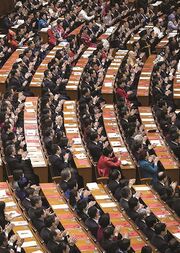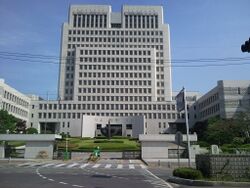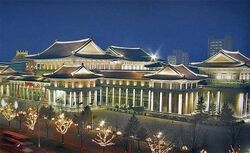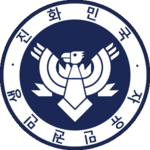Politics of Zhenia
Politics of the Republic of Zhenia | |
|---|---|
 | |
| Polity type | Unitary semi-presidential republic |
| Constitution | Constitution of the Republic of Zhenia |
| Legislative branch | |
| Name | Parliament of the Republic of Zhenia |
| Type | Bicameral |
| Meeting place | National Parliament Hall |
| Presiding officer | Han Jinhyuk, Speaker of the National Assembly |
| Executive branch | |
| Head of State | |
| Title | Chancellor of the Republic of Zhenia |
| Currently | Lee Saemin |
| Appointer | Direct Popular Vote |
| Head of Government | |
| Title | Premier of the Republic of Zhenia |
| Currently | Kim Junghun |
| Appointer | Chancellor of the Republic of Zhenia |
| Cabinet | |
| Name | Government of Zhenia |
| Current cabinet | Kim Junghun Cabinet |
| Leader | Premier of the Republic of Zhenia |
| Deputy leader | Chancellor of the Republic of Zhenia |
| Appointer | Chancellor, with consent from National Assembly |
| Headquarters | The Zhongwu Palace |
| Ministries | 17 |
| Judicial branch | |
| Name | Republic of Zhenia Supreme Court |
| Constitutional Court | |
| Chief judge | Dongyoon Na |
| Seat | Chief Justice |
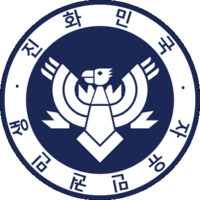 |
|---|
| This article is part of a series on the politics and government of Zhenia |
The political system of the Republic of Zhenia operate under the principles laid out by the Constitution of the Republic of Zhenia, which specifies the Republic of Zhenia as a unitary semi-presidential republic with a semi-direct democracy. To actualize such principles, the constitution also clarifies the existence of the separation of powers between the branches of government, as well as its adherence to national sovereignty. Rights of individual provinces maintain an equilibrium with the authorities of the federal government, as stated in the Constitution.
The separation of powers in Zhenia is done through the division of the nation's political structure into four branches - the legislative, executive, judicial and examination branches. The legislative branch is primarily led by the Parliament, which consists of two houses - the Sangseowon and the National Assembly. The executive branch, primarily comprising of the Government of Zhenia, works through the cabinet being led in tandem by the Chancellor and the Premier. The judicial branch is primarily led by the Republic of Zhenia Judiciary and the Department of Justice, which spearheads a hierarchic structure of province-level and municipal-level courts across the nation. The Jungchuwon is the heart of the examination branch, overseeing the entire process of selecting civil servants and governmental officials. The Constitutional Court exists independent from the aforementioned four branches of government, examining the constitutionality of existing laws and systems.
Throughout much of its modern history, the Republic of Zhenia has called for and pursued a multiparty system in its politics, as made clear in the Constitution. Since the dawn of the Fourth Republic in 1979, three political parties - the Union of Neo-Renism, the Nationalist Party and the Liberal Democratic Party - have led a bulk of Zhenian politics, coexisting as major parties among other smaller parties. Such political parties attempt cooperation in creating and passing laws, although they stand off against each other starkly in some politically sensitive issues.
While a representative democracy is done in Zhenia for realistic reasons, there are indeed elements of direct democracy present in the nation's politics. A nationwide referendum is necessary for any revisions in the Constitution, while a referendum can be held on laws upon request. In addition to referendums, the people can call for a recall on government officials following a manifesto on the official's policies, while the National Petition System allows for them to present public initiatives to revise or create laws and statutes, as well as even make amendments in the constitution.
Political Culture
Since the November Revolution of 1979, Neo-Renism has been the key ideology behind the political culture of the Republic of Zhenia. The ideology, centered around egalitarian rights granted to all Zhenians regardless of ethnicity or political alignment and centralized power to lead Zhenia as one, specifies that all Zhenians have the responsibility to participate in election, understand and support the nation's government, both central and local, be educated, pay taxes and perform military service when needed; as well as the rights to free speech, freedom of expression, freedom of religion, freedom of assembly and association and equality before the law. Most of the core principles of Neo-Renism has been specified clearly in the Constitution.
The Constitution holds the right to vote a sacrosanct right for all Zhenian citizens to participate in politics. The duty of controlling how voting and elections take place is at the hands of the federal government, with no right given to the provincial and local governments to restrict the process of voting, although with a few exceptions. In principle, voting takes place on one designated day, usually a weekday; alternatively, Zhenian citizens can preemptively vote in elections on the weekend directly before the designated election day, in a period known as 'Early Voting Day' (Zhenian: 사전투표일), which consists of at least two days of the weekend and can take up to three days, spanning Friday through Sunday. Ballots cast in Early Voting Days are counted as the same votes as those on the designated election day.
Aside from elections and voting, the Constitution allows for referenda on legislation if it is requested by a sizable portion of the nation's population. Referendums on legislation mostly initiate with a proposal/petition that is approved by 200,000 Zhenian citizens of voting age within 50 days, after which it is assessed by members of the National Assembly. The National Assembly and the Sangseowon can propose a counter-proposal in response to such proposal. Following assessment within the National Assembly, the said proposal(s) are sent to the referendum. Changes to the legislation can be passed after a 50% approval rate achieved by the referendums requested on the legislation, although any amendment to the Constitution requires the consent of at least 60% of the nation's population on the referendum.
Legislative Branch
The bicameral Zhenian Parliament is the primary legislative branch in the nation, with the President of the Sangseowon (also the Premier at its head. It consists of 170 members of the Sangseowon and 900 members of the National Assembly, with the former meant to adjust for the differences between province-level areas in population size for equal representation. As the nation's legislative branch, the Parliament is tasked with the drafting, passing and enactment of laws, including proposals to amend the Constitution, while providing consent to the nomination of the appointment of the cabinet as well as chief justices of the nation's judiciary, assess and settle the government's budget proposals, lead governmental investigations regarding issues at hand, and, if deemed necessary, call for the impeachment of high-ranking government officials and both the heads of state and government.
Sangseowon
The Sangseowon is the upper house of the bicameral Parliament of the Republic of Zhenia. Consisting of five directly-elected representatives (영사/影事) from each province-level administrative area, including the Haedong SAR, resulting in a total of 170 representatives. Despite being part of the Parliament, it is rare for Sangseowon representatives to directly draft legislation proposals; instead, the Sangseowon primarily assesses legislation that has passed the National Assembly. It also exerts authority over national matters that have to be passed quickly, such as the ratification of international treaties involving Zhenia, the dispatching of troops in foreign territories and consent over the appointment of high-ranking governmental officials, including the Premier. It also retains the right to expel a Sangseowon representative with the consent of over two-thirds of the remaining Sangseowon representatives and judge impeachments against high-ranking governmental officials and heads of government or state, although the motion of impeachment is called by the National Assembly.
National Assembly
The National Assembly forms the lower house of the Parliament of the Republic of Zhenia, with its purpose aimed towards the representation of the Zhenian people. The National Assembly consists of a total of 900 assemblymen, 575 of which are elected from local constituencies proportionate to population, while the remaining 325 are elected under the system of proportional representation and are assigned by the party. National Assemblymen, in their respective local constituencies, are elected through a single-member electorate system, with only one assemblymen assigned to each constituency.
The National Assembly is primarily responsible for the drafting and initial passing of all legislation proposals, as well as assess them at earlier phases than the Sangseowon. Along with the Sangseowon, a group consisting of 15 or more National Assemblymen can form negotiation bodies to preemptively open up discussion on legislative matters and converge the opinions of the nation's respective political parties regarding such issues. The National Assembly is primarily responsible for laws regarding the government's budget proposals and taxation, as well as the assessment of the government's budget, although the latter is done alongside the Sangseowon. It can also call to motion for impeachment against high-ranking government officials and heads of state or government, which are then assessed and judged by the Sangseowon.
Executive Branch
Zhenia has adopted a semi-presidential system in which the head of state and head of government are separated in principle, although the head of state retains greater authority over the executive branch than in theory. The Chancellor, as head of state, is elected every five years can run up to three terms, all of which can, in theory, be consecutive. The Chancellor has the right to appoint the Premier to be on the same vote as himself during his elections, as well as exercise rights to form the cabinet alongside the Premier, although the latter is primarily restricted to government officials concerning the nation's foreign policy, including foreign ambassadors and the Minister of Defense. While he too can be subject to impeachment from the Sangseowon, the Chancellor can call for the disbanding of both houses of the Parliament if a political impasse continues, in defense of the executive branch. While the Chancellor, along with the Premier, can veto legislation and ask for the involvement of the Constitutional Court if needed, the Chancellor can propose bills to the National Assembly while the Premier cannot.
While the Chancellor does retain rights to intervene in the executive branch, the Premier, who also often overtakes the role of the President of the Sangseowon, is primarily responsible for the day-to-day operations of the Government of Zhenia. The Premier, elected on the same vote as the Chancellor via direct nationwide elections, is to be appointed by the Chancellor and can also serve up to three five-year terms; although serving the same term as the Chancellor, he can retain position even if the Chancellor alone is impeached or removed from office The Premier has the right to form the cabinet which requires the consent of the Sangseowon; the cabinet is to resign either when their respective terms are over or the Sangseowon, with consent from the National Assembly, passes a vote of no confidence against the cabinet. While the Premier cannot directly propose bills to the National Assembly like the Chancellor can, the Premier retains the rights to directly introduce bills for discussion in the Sangseowon that have not passed a majority vote in the National Assembly, as long as it has been approved by over a third of the National Assembly.
The Cabinet of the Republic of Zhenia is an executive body consisting of the nation's ministries and executing the day-to-day affairs of the nation. Appointed by the Chancellor and the Premier and approved by the Sangseowon, its ministers are in charge of their respective ministries. It is mandatory for all ministers to partake in the National Security Council, an emergency executive and legislative body activated in times of national crisis or in times of war. The Minister of Defense is at the top of the hierarchy of succeeding the head of government and state in case the head of state, government and the President of the National Assembly are all in conditions unable to perform governmental affairs, while a further order of hierarchy is assigned among the ministers in such cases of emergency. As of April 2020, the nation's ministries consist as follows:
Local government
Local government in Zhenia, is structured in a hierarchy under the central government in accordance to the nation's administrative subdivisions, with province-level areas at the top and its area of jurisdiction decreasing from prefecture-level, municipality-level and township-level. Each level of local government is structured to effectively oversee and exchange feedback with its lower levels of the administrative hierarchy. Each level of local government has its own administrative head, which works in tandem with the local cabinet and the local assembly (excluding township-level areas) to run the government of the given administrative subdivision, while retaining the rights to appoint the members of the local cabinet, as well as carrying out policies and ceremonial duties. With the exception of some township-level subdivisions, all executive heads of local government are elected directly by the people through regional elections.
While all of such local leaders were traditionally appointed by the central government with consent from the Chancellor to ensure consistency in administration, the Fourth Republic has shifted to offer further autonomy in broader areas of policy such as regional taxation and transportation, as well as the right to enforce their own statutes and elect their own leaders. Local autonomy in Zhenia has been practiced since the second term of Li Shan in 1983, when the first elections for the administrative heads of provincial, prefectural and municipal governments took place.
Judicial Branch
Overseeing the nation's justice system, the Judiciary of Zhenia forms the nation's judicial branch. Consisting of politically independent courts, it oversees each cases at the hands of professional judges, although the trial of some cases can be judged by selected members of the jury. A single case able to be examined in court up to three times, each at different levels of court; a hierarchy of such courts, consisting of the Supreme Court, Higher and Regional Courts, allows for the decision of the higher court overruling the decision of the lower court.
Although not formally part of the judicial branch, Zhenia also has a Constitutional Court within its justice system. Consisting of nine members appointed from the Sangseowon, the Chancellor, the Supreme Court and the Jungchuwon, it gathers to judge upon matters that require evaluation via the Constitution, while it does not normally oversee normal legal cases in accordance to the Constitution. Cases examined in the Constitutional Court are normally cases with decisions that have received great public backlash in all three decisions by the court or controversial cases that require the judgement with the Constitution at hand.
Examination Branch
As the fourth branch both examining the remainder of the government and those who are involved in it, the Jungchuwon is the nation's examination branch, fulfilling the stability of power as decreed by Renism. Initially established in respect of the public examination system to select government officials in pre-modern Zhenia, the Jungchuwon was initially tasked to oversee all processes in which those who work for the nation's government are chosen, having a say in the consent of cabinet members, chief justices and other high-ranking government officials, as well as managing the selection process of all civil servants with the National Civil Service Examination (NCSE). It has, however, taken on additional roles to keep the overflowing of political power from certain governmental branches at bay, overseeing corruption of government officials, retaining the rights to impeach government officials and partaking in the analysis of the government budget. In its role of overseeing the government, it works alongside the National Prosecution Service and the Board of Inspection and Audit, which are under the Ministry of Justice and under the leadership of the Chancellor respectively.
Although its primary role has been centered on the inspection and examination of all of those that constitute the government, its roles have expanded onto the examination and nurturing of the nation's high academia. Working in tandem with the Ministry of Education, Science and Technology, it is in charge of overseeing many of Zhenia's national high academic projects, including the management and operation of national research institutes, with numerous agencies, including the National Institute for Basic Sciences and the Institute of Foreign Policy and Affairs. Hence, its secondary role as the representation of Zhenia's higher academia has earned its nickname, the "Zhenian think tank".
Elections
The Zhenian Constitution holds the rights of political participation to all Zhenians of legal age sacrosanct, regardless of ethnicity, gender, wealth and other socioeconomic reasons, with the exception being criminals who are currently serving sentences in the nation's penitentiary facilities, under house arrest or those with mental illnesses that are deemed unable to make judgement without the tutorship of another. Among the central government, Zhenians directly elect the Chancellor and the Premier on the same election, while they also elect the Sangseowon Representative of their province-level administrative area and cast two additional votes, each for the National Assembly representative of their local constituency and for the National Assembly's proportionate representation system respectively, on the general election.

